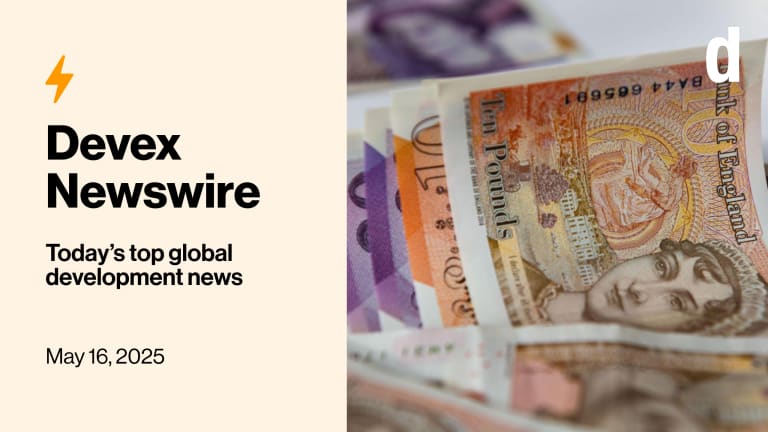
UNICEF’s Child Nutrition Fund wants to raise billions to tackle malnutrition. Backed by major global donors – think Gates – it has already launched initiatives to improve nutrition and maternal health. The fund wants long-term solutions to combat malnutrition and food shortages.
Also in today’s edition: We look at the fallout over the European Union’s delay on its deforestation law, find out how plant-based diets can help climate costs, and look toward the World Bank annual meetings.
+ Up for a quick challenge? Take our monthly quiz!
Smart solutions, big impact
This is a preview of Newswire
Sign up to this newsletter for an inside look at the biggest stories in global development, in your inbox daily.
UNICEF’s Child Nutrition Fund is on a mission to fight malnutrition in women and children, aiming to raise $2 billion by 2030 to help 350 million people across 23 countries, mostly in Africa and Asia. With malnutrition, particularly wasting, still affecting millions of children, the fund is stepping in to offer a lifeline. And it’s got some big players behind it — like the Gates Foundation and the U.K.’s Foreign, Commonwealth & Development Office — to get the job done.
So far, they’ve raised $270 million and already started initiatives like a $30 million matching fund in Ethiopia to tackle child malnutrition and boost immunization, writes Katrina Lane for Devex.
The fund isn’t just about money; it’s about smart coordination, ensuring global donors work together and that resources go where they’re needed most. One exciting initiative? They're introducing multiple micronutrient supplements to replace the old iron-folic acid ones, improving maternal health and cutting down low birth weight — all for just $2.60 per pregnancy.
The fund is also a bit of a supply chain hero. During the global food crisis, it secured enough ready-to-use therapeutic food, or RUTF, to feed 5 million children, avoiding any shortages for the first time. With ambitious goals of raising $3.4 billion annually to tackle malnutrition and support maternal health, this fund is looking to create real, lasting change — and make sure no child is left behind in the fight against hunger.
Read: What is the Child Nutrition Fund? (Pro)
ICYMI: Gates Foundation sounds the alarm on the crisis of child malnutrition
+ Not yet a Devex Pro member? Start your 15-day free trial today to access all our expert analyses, insider insights, funding data, exclusive events and career resources, and the Pro Insider — a special Sunday newsletter covering our industry’s big moves for Pro members.
EU delays deforestation law
The European Union has been accused of “a shameful about-face” after delaying a law to tackle the world’s deforestation crisis — raising fears it will be nixed altogether as Europe’s far-right shift accelerates.
The EU Deforestation Regulation, designed to end imports of a wide range of goods produced at the cost of forest loss, was due to come into force at the end of 2024, but could be shelved for a year after a backlash at home and abroad, my colleague Rob Merrick tells me.
The initiative has opened up a sharp divide in many lower-income countries between environmentalists who love it and politicians who fear the economic hit from complex compliance requirements, especially on small farmers.
At this year’s Munich Security Conference, Barbados’ Prime Minister Mia Mottley warned “millions of people in Africa” would no longer be able to sell their products in the crucial EU market, telling her largely European audience: “You can't work good for the planet and do bad for the people.”
The European Commission — pointing to concerns about “their state of preparedness” raised by several country’s leaders at last week’s United Nations General Assembly — downplayed the delay as simply a new “phasing-in period to ensure proper and effective implementation.”
However, the Climate Observatory, a network of NGOs in Brazil, accused the EU of “throwing away three years of work” with its “shameful about-face” even as “Brazil is being consumed by fires.”
It noted the rise of far-right parties in both Brussels and European capitals, warning: “The European Parliament and the conservative-majority European Council now have the opportunity to weaken the EUDR to the point of rendering it ineffective.”
ICYMI: Why Mia Mottley is lashing out at EU's bid to protect world's forests (Pro)
+ Listen: In the latest episode of our weekly podcast series, Devex’s David Ainsworth, Fiona Zublin, and Vince Chadwick discuss foreign aid cuts across Europe and other top global development stories from this week.
Remaining civil
The United Nations General Assembly sucks up all the oxygen in September, but in October, all eyes turn to the International Monetary Fund and World Bank annual meetings in Washington, D.C.
Civil society organizations, or CSOs, typically have a lukewarm relationship with the World Bank, often accusing it of leaving them out of key discussions. And one of the most consequential discussions at this year’s meetings will be the replenishment of the International Development Association, the bank’s concessional lending lifeline for the lowest-income nations.
But the bank is trying to make sure CSOs have their say by convening international forums for them in the lead-up to the 21st replenishment, Akihiko Nishio, the World Bank’s vice president for development finance, writes in a Devex opinion piece.
“The main purpose of these forums is for senior leaders of the World Bank, IDA donors, and IDA borrowers to listen to the voices of civil society, promoting mutual understanding of what IDA21 ought to focus on,” he writes.
“IDA shares many of the concerns raised by CSOs: for example, that the global debt crisis is hindering governments in many low-income countries from providing essential services. IDA financing is structured with this issue in mind: it provides low-cost loans and a high volume of grants, which do not need to be repaid, to highly indebted low-income countries,” Nishio adds.
World Bank President Ajay Banga is hoping for a big IDA replenishment come December, and it looks like he’s getting a head start. On the sidelines of UNGA, Denmark’s Prime Minister Mette Frederiksen announced that her country would increase its IDA contribution by 40% and urged “all donors, old and new ones, to follow the example.”
Opinion: Why IDA is deepening its partnership with civil society
ICYMI: World Bank's Banga wants 'largest of all time' IDA replenishment (Pro)
+ For more content like this, sign up to Devex Invested, a free, weekly newsletter bringing you the insider brief on business, finance, and the SDGs.
‘Cool’ solutions through innovation
Ankur Vora, Bill Gates' top strategy adviser, calls his job “the coolest on the planet.” At a Devex event on the sidelines of the UNGA, he shared how the Gates Foundation tackles global challenges like child mortality and poverty by focusing on innovation and localization.
Vora highlighted India’s role in health care innovation, developing affordable solutions like TB diagnostics that are scaling globally. He stressed that local communities should lead the way in creating solutions, as they best understand the challenges on the ground.
Vora is also excited about digital public infrastructure, like India’s digital ID system, which the foundation hopes to replicate worldwide. Despite setbacks from climate change and health crises, he remains optimistic that local innovations will drive scalable, impactful change.
Read: Ankur Vora — Bill Gates' strategist on global health and local innovation
+ Catch up on our coverage of the 79th U.N. General Assembly.
Plant-based diets to beat climate costs
Shifting to plant-based diets is not only healthier for people and the planet, but it’s also far cheaper than other climate solutions, like electric cars and renewable energy, according to new research from the Tilt Collective. The group, which launched at Climate Week NYC, aims to reduce reliance on meat by funding initiatives that promote sustainable, plant-rich diets.
The study found that cutting meat would cost $160 billion annually while achieving greater carbon reduction than electric vehicles or clean energy investments, which have an annual cost of $185 billion and $1.4 trillion, respectively, writes Rebecca Root for Devex. With a return on investment five times higher than renewable energy, the Tilt Collective is framing plant-based food as the smart, cost-effective solution to climate change. By targeting governments and businesses to offer more plant-based options, they hope to make a real impact on both emissions and global food systems.
“Our approach is one that acknowledges we will not achieve this success by pleading with people to eat differently. We've tried that, and it hasn't gotten us very far,” says Tilt Collective CEO Sarah Lake. “Instead, we must … drive companies and governments to offer and incentivize healthy and sustainable options.”
Read: Shift to plant-based food more cost-effective than green energy, EVs
In other news
At least 18 people were killed in the Tulkarem refugee camp in the occupied West Bank, following an airstrike that the Israeli military claimed killed a local Hamas leader. [The Guardian]
Kenya's government has asked the IMF to conduct an official assessment of corruption and governance issues, after a push by Western nations. [Reuters]
The U.K. government has pledged nearly £22 billion for projects to capture and store carbon emissions from energy, industry, and hydrogen production. [BBC]
Sign up to Newswire for an inside look at the biggest stories in global development.




